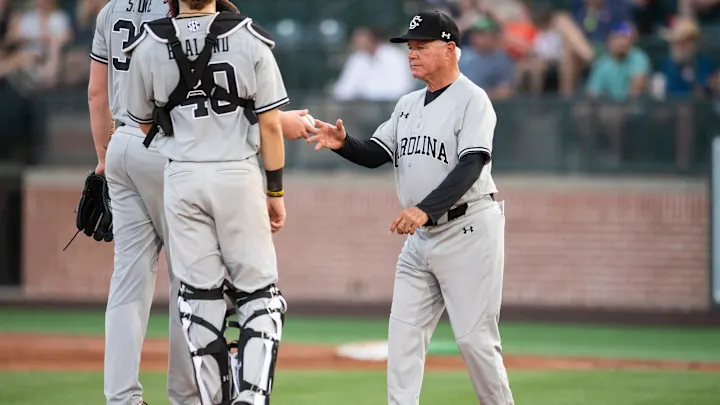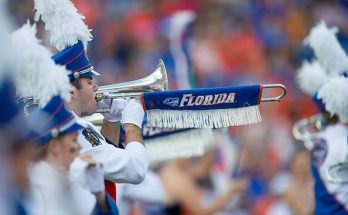The South Carolina Gamecocks baseball program has been dealt a significant blow, as standout infielder Michael Braswell III has officially entered the NCAA transfer portal. The move marks a pivotal moment not only for Braswell’s career but for the trajectory of a South Carolina team that had hoped to build on the flashes of promise it showcased over the past few seasons. As the dust settles, the loss stings—deeply.
Braswell, a former top-100 national prospect and one of the most versatile players on South Carolina’s roster, leaves behind a complicated legacy. Lauded for his defensive excellence and high baseball IQ, Braswell was viewed as a cornerstone for the Gamecocks’ infield. His entrance into the portal has sparked a whirlwind of speculation, frustration, and reflection among fans, coaches, and analysts alike.
At the heart of Braswell’s decision lies a broader narrative about college athletics in 2025—one dominated by player mobility, NIL considerations, and the constant re-shuffling of rosters. For South Carolina, his departure is more than just a depth chart adjustment; it’s the loss of a leader, a reliable glove, and a player who represented the program’s future.
Braswell’s career began with tremendous promise. As a freshman, he burst onto the scene with clutch performances and steady defense, quickly becoming a fan favorite. His poise under pressure stood out immediately, and his fielding at shortstop was nothing short of elite. Although he experienced offensive growing pains at the plate, coaches remained confident that his bat would come around. That patience paid off at times, with flashes of improvement in key moments, though consistency remained elusive.
Still, Braswell’s intangibles—his work ethic, leadership qualities, and commitment to the team—often outweighed any statistical shortcomings. He brought a quiet confidence and toughness to the diamond, endearing himself to coaches and teammates. In an age where flashy numbers often dominate headlines, Braswell embodied the traditional values of grit, sacrifice, and defense-first baseball. That made his transfer all the more shocking.
Sources close to the program indicate that Braswell’s decision to transfer was not made lightly. While no single factor has been cited, a confluence of issues appears to have played a role. Playing time, offensive struggles, competition for starting roles, and the evolving dynamics of the locker room likely contributed. With new recruits entering the fold and transfer additions reshaping the roster, Braswell may have seen a changing role ahead.
But beyond the tactical reasons, there’s a personal dimension to this move. For a player who gave everything to the program and wore the Gamecocks jersey with pride, stepping away isn’t simply about baseball—it’s about doing what’s best for his long-term growth and career. Whether that means a fresh environment, different coaching, or a more defined role elsewhere, Braswell is clearly betting on himself. And that’s something few can fault him for.
From a programmatic standpoint, South Carolina head coach Mark Kingston now faces pressing questions about how to reconfigure the infield. Braswell’s defensive stability will be hard to replace, especially considering the Gamecocks already had concerns about middle infield depth. While the team does boast promising young talent and incoming recruits, replicating Braswell’s experience and leadership won’t be easy.
In terms of production, Braswell’s offensive numbers weren’t eye-popping, but his ability to manufacture runs, extend at-bats, and come through in key moments gave the Gamecocks a subtle but meaningful boost. Even when his batting average dipped, his glove ensured he remained a fixture in the lineup. His double-play chemistry with other infielders, particularly at second base, played a huge role in the Gamecocks’ defensive efficiency.
The loss also has implications for South Carolina’s culture. Braswell was seen as a unifier in the locker room—respected by both upperclassmen and newcomers. His departure may not spark turmoil, but it undeniably leaves a leadership void. For a team hoping to compete in the cutthroat SEC and return to national relevance, chemistry and cohesion are paramount. Losing a glue guy like Braswell hurts in ways that box scores can’t capture.
Recruiting, too, may feel the ripple effects. Braswell’s exit might prompt questions from prospects about program stability and internal dynamics. While every team deals with attrition, losing a high-character player with strong ties to the program can impact perception. That’s especially true in the modern NIL and transfer era, where players increasingly prioritize fit, development, and exposure.
For Braswell, the future holds plenty of intrigue. There will be no shortage of suitors. His glove alone makes him a valuable asset for any top-tier program looking to bolster its infield. If he can continue to develop offensively and find consistency at the plate, he has the potential to be a difference-maker wherever he lands. Teams in need of a shortstop or second baseman with high defensive upside will undoubtedly come calling.
His decision also underscores the shifting landscape of college baseball. No longer is the transfer portal viewed as a last resort or a source of instability; for many, it’s a strategic move—a chance to reboot, rebrand, and reemerge. Braswell is merely the latest in a long line of talented players seeking the right environment to thrive.
Still, for Gamecock fans, this one hurts. Braswell was more than just a player—he was a symbol of what South Carolina baseball aspired to be: tough, reliable, team-oriented. Watching him leave brings a sense of unfinished business. The moments of brilliance, the potential for a breakout year, the leadership he brought—it all felt like it was building toward something. Now, it’s all left to wonder and what-ifs.
In the coming weeks, South Carolina will no doubt adjust. The transfer portal taketh, but it also giveth. Kingston and his staff are already working the phones, identifying replacements, and ensuring the roster remains competitive. And make no mistake, the Gamecocks still possess talent, drive, and ambition. But the road ahead just got a bit rockier.
Fans will point to Braswell’s early promise and lament the missed opportunity to see his full potential realized in Columbia. Some will question why the coaching staff couldn’t find a way to keep him happy or in a role that suited his strengths. Others will simply wish him well and thank him for his service, acknowledging that sometimes change is necessary—for both the player and the program.
What cannot be debated is the impact Braswell had during his time at South Carolina. From his sterling freshman campaign to the quiet leadership he provided behind the scenes, his presence was felt every day. Whether diving for a grounder, turning a slick double play, or offering encouragement in the dugout, he played the game the right way. And that legacy will endure, even as he dons a new jersey in the months to come.
As the Gamecocks prepare for life after Braswell, they’ll need to rely on resilience—a quality that has defined their best seasons in the past. Perhaps a young player will step up and seize the moment. Maybe a surprise transfer will bring new life to the infield. What’s certain is that the path forward will demand both patience and boldness.
In the ever-evolving world of college baseball, change is constant. Rosters are fluid. Stars come and go. But for every door that closes, another opens. For Michael Braswell III, this is the next step in a journey filled with promise. For South Carolina, it’s a reminder that success requires adaptation, clarity of vision, and, above all, unwavering commitment to the grind.
The portal may have claimed another name, but the story is far from over—for both sides.



